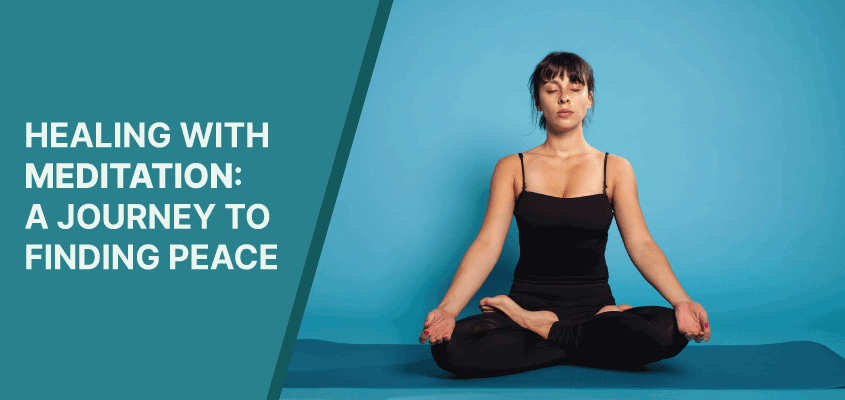Introduction
Meditation has been a powerful tool used for healing and self-growth for thousands of years. Meditation’s ability to calm the mind and concentrate on the present moment has a profound healing effect on the body and mind, alleviating stress, Anxiety, and physical discomfort[1], improving emotional regulation and attention, and increasing self-awareness [2]. Regular meditation practice can initiate a person’s journey toward healing.
Defining Healing With Meditation
Meditation is a broad term that includes various techniques available for meditation, such as mindfulness meditation, mantra meditation, chi-gong [2], loving-kindness, transcendental meditation, body scan, etc. All these techniques require focusing attention in a certain way in a non-judgemental manner [3, p.190] [4].
To provide a consistent definition, Cardoso and his colleagues [5] gave five parameters of what is included in a meditation technique. This includes:
1) Specific technique: One does not simply sit and meditate; there is a procedure and a method to the practice.
2) Muscle relaxation: At some point in the meditation, one experiences peace in mind and body.
3) Logic Relaxation: There needs to be more intention to analyze, expect, and judge anything in practice.
4) Self-Induced state: While there can be a teacher, meditation is done by oneself and is not dependent on any external resource.
5) Anchor: There is a point of focus to return to (for example, breath, body, flame, etc.) when one finds their mind wandering.
Some believe that healing through meditation occurs because it generates a “relaxation response” wherein part of the brain responsible for perceiving stress slows down [6]. While the exact mechanism is not yet precise, and some have found flaws in this explanation [7], there is considerable evidence that meditation can have healing effects for various problems that one faces in one’s life [1] [8].
How Do You Get Started with Healing with Meditation?
Starting with the process of meditation is easy. Some steps that can be considered are as follows:
1) Set an intention: One must have a goal or purpose before beginning. This could be a specific physical, emotional, or spiritual issue or simply a choice to promote overall well-being.
2) Carve out space and time: Meditation requires a space and time where one can sit quietly without distraction. Scheduling meditation for a particular time and place increases the chances of commitment to the practice.
3) Choose a technique: There are many meditation techniques; one can experiment with them and note which works best.
4) Seek guidance and support: When starting the journey, figuring out what to do and how becomes overwhelming. One can consider seeking a master, joining a class, or an online course (for example, The healing with meditation course in United We Care [9])
5) Establish a short and consistent practice: Consistency is more important than length or depth in meditation. Thus, starting small 5-10-minute practices helps build a habit.
Why is Healing with Meditation Necessary?
It has been widely documented that meditation has several physical, social, and psychological benefits. When one begins their journey in meditation, healing on all fronts becomes apparent.
Physical Benefits of Meditation
Meditation can improve the physical health of an individual, and many studies have documented its wide-ranging effects. For instance:
- Meditation improved the quality of gut health in the participants [10].
- It is effective in reducing chronic pain [11]
- It has positive outcomes on disorders like Fibromyalgia [12]
- It has positive effects on blood pressure, cholesterol, drug abuse, and even lowers risks of heart diseases [13]
- Finally, meditation alters neural pathways in different regions of the brain, which have wide-ranging effects on the person [2]
Psychological Benefits of Meditation
Meditation also significantly impacts an individual’s mental health [1] [13]. Studies have shown that meditation:
- Reduces Anxiety in individuals of different populations [1] [14]
- This leads to a considerable reduction in stress [1] [8] [14]
- It has also reduced tendencies of perfectionism [14]
- Aids in lowering symptoms of depression [1] [8] [14]
- Improves cognitive capacities such as attention [8], working memory, planning, decision-making, etc. [13]
- Enhances self-awareness and self-regulation[8]
- Since meditation is linked with spirituality, it might enhance spiritual well-being in an individual.
Social Benefits of Meditation
Certain types of meditation, like loving-kindness meditation, have also been known to improve social relationships and relationships with the self. They increase the capacity of compassion in an individual, which positively impacts social interaction [15].
What are The Challenges You Might Face for Healing with Meditation?
While meditation has immense benefits, beginning the journey in meditation has considerable challenges. Broadly, the challenges in meditation are as follows:
1) Learning is complex: Meditation requires practice like any other skill. For the first few days or months, one may find it challenging to sit and focus. Many individuals feel demotivated and stop the course early on owing to this
2) Transformation is slow and sometimes invisible: Individuals often meditate with the idea that it will transform them but must realize that this process will be prolonged. Thus, their expectations are violated, and they drop out [16].
3) There is a question of “doing it right”: Many individuals keep doubting themselves and whether or not they are correctly doing the meditation [16]. These doubts make the experience unpleasant
4) Intrusive thoughts may arise: Participants often report facing thoughts and feelings that disturb them and are challenging to manage. This causes stress instead of reducing it. [16]
5) For some, it may have a dark side: especially for individuals with a history of mental health issues, meditation may bring about or worsen episodes of Anxiety, depression, confusion, meaninglessness, and lack of interest in life [17]. These may be scary and debilitating for some people.
It should be noted that most of these challenges can be mitigated when one has a guide in their journey towards meditation. Further, it has to be acknowledged that for those having severe mental health concerns, meditation alone will not be enough. They must consult a mental health professional and work on the root cause of their fears alongside meditation.
Conclusions
Meditation refers to a range of practices that involve specific techniques, muscle, and logic relaxation, self-focused skills, and anchors. It has a range of healing benefits, and it reduces stress, prevents physical health issues, lowers Anxiety and depression, and can even improve social relationships. Thus, starting regular meditation practices can have immense benefits, which may lead to holistic transformation. Although there are some challenges when starting meditation, these can be mitigated by enrolling in courses [9] or seeking the help of a master.
References
[1] Madhav Goyal, M.D. (2014) Meditation for psychological stress and well-being, JAMA Internal Medicine. JAMA Network. Available here: (Accessed: April 7, 2023).
[2] Tang, Y.-Y., Hölzel, B.K. and Posner, M.I. (2015) “The Neuroscience of Mindfulness Meditation,” Nature Reviews Neuroscience, 16(4), pp. 213–225. Available here: The neuroscience of mindfulness meditation
[3] Taylor, S.E. (2012) in Health psychology. New York: McGraw-Hill, pp. 190 190.Available here
[4] Baer, R.A. (2003) “Mindfulness training as a clinical intervention: A conceptual and empirical review.” Clinical Psychology: Science and Practice, 10(2), pp. 125–143. Available at: Mindfulness Training
[5] Cardoso, R. et al. (2004) “Meditation in health: An operational definition,” Brain Research Protocols, 14(1), pp. 58–60. Available here
[6] Benson, H., Beary, J.F. and Carol, M.P. (1974) “The relaxation response,” Psychiatry, 37(1), pp. 37–46. Available here
[7] Holmes, D.S. (1984) “Meditation and somatic arousal reduction: A review of the experimental evidence.” American Psychologist, 39(1), pp. 1–10. Available here
[8] Tang, Y.Y. (2014) “Short-term meditation intervention improves self-regulation and academic performance,” Journal of Child and Adolescent Behaviour, 02(04). Available here
[9] (no date) Find the right professional – United We Care. Available here :(Accessed: April 7, 2023).
[10] Kanchibhotla, D., Sharma, P. and Subramanian, S. (2021) “Improvement in gastrointestinal quality of life index (GIQLI) following meditation: An open-trial pilot study in India,” Journal of Ayurveda and Integrative Medicine, 12(1), pp. 107–111. Available here
[11] Kabat-Zinn, J., Lipworth, L. and Burney, R. (1985) “The clinical use of mindfulness meditation for the self-regulation of chronic pain,” Journal of Behavioral Medicine, 8(2), pp. 163–190. Available here
[12] Sephton, S.E. et al. (2007) “Mindfulness meditation alleviates depressive symptoms in women with fibromyalgia: Results of a randomized clinical trial,” Arthritis & Rheumatism, 57(1), pp. 77–85. Available here
[13] Sharma, H. (2015) “Meditation: Process and effects,” AYU (An International Quarterly Journal of Research in Ayurveda), 36(3), p. 233. Available here
[14] Burns, J.L., Lee, R.M. and Brown, L.J. (2011) “The effect of meditation on self-reported measures of stress, anxiety, depression, and perfectionism in a college population,” Journal of College Student Psychotherapy, 25(2), pp. 132–144. Available here
[15] Galante, J. et al. (2014) “Effect of kindness-based meditation on health and well-being: A systematic review and meta-analysis.” Journal of Consulting and Clinical Psychology, 82(6), pp. 1101–1114. Available here
[16] Lomas, T. et al. (2014) “A qualitative analysis of experiential challenges associated with meditation practice,” Mindfulness, 6(4), pp. 848–860. Available here
[17] The dark side of the meditation: How to dispel this darkness – research gate (no date). Available here (Accessed: April 7, 2023).





